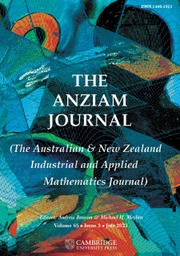No CrossRef data available.
Article contents
Explicit bounds for third-order difference equations
Published online by Cambridge University Press: 17 February 2009
Abstract
Core share and HTML view are not available for this content. However, as you have access to this content, a full PDF is available via the ‘Save PDF’ action button.
This paper gives explicit, applicable bounds for solutions of a wide class of third-order difference equations with nonconstant coefficients. The techniques used are readily adaptable for higher-order equations. The results extend recent work of the authors for second-order equations.
Keywords
- Type
- Research Article
- Information
- Copyright
- Copyright © Australian Mathematical Society 2006
References
[1]Berenhaut, K. S. and Goedhart, E. G., “Explicit bounds for second-order difference equations and a solution to a question of Stević”, J. Math. Anal. Appl. 305 (2005) 1–10.CrossRefGoogle Scholar
[2]Došlá, Z. and Kobza, A., “Global asymptotic properties of third-order difference equations”, Comput. Math. Appl. 48 (2004) 191–200.CrossRefGoogle Scholar
[3]Henderson, J. and Peterson, A., “Disconjugacy for a third-order linear difference equation”. Advances in difference equations, Comput. Math. Appl. 28 (1994) 131–139.CrossRefGoogle Scholar
[4]Hussein, H. A., “An explicit solution of third-order difference equations”, J. Comput. Appl. Math. 54 (1994) 307–311.CrossRefGoogle Scholar
[5]Mallik, R. K., “On the solution of a third-order linear homogeneous difference equation with variable coefficients”, J. Differ Equations Appl. 4 (1998) 501–521.CrossRefGoogle Scholar
[6]Parhi, N. and Tripathy, A. K., “On oscillatory third-order difference equations”, J. Differ. Equations Appl. 6 (2000) 53–74.CrossRefGoogle Scholar
[7]Popenda, J. and Schmeidel, E., “Nonoscillatory solutions of third-order difference equations”, Portugal. Math. 49 (1992) 233–239.Google Scholar
[8]Smith, B., “Quasi-adjoint third-order difference equations: oscillatory and asymptotic behavior”, Internat. J. Math. Math. Sci. 9 (1986) 781–784.CrossRefGoogle Scholar
[9]Smith, B., “Oscillatory and asymptotic behavior in certain third order difference equations”, Rocky Mountain J. Math. 17 (1987) 597–606.CrossRefGoogle Scholar
[10]Smith, B., “Oscillation and nonoscillation theorems for third-order quasi-adjoint difference equations”, Portugal. Math. 45 (1988) 229–243.Google Scholar
[11]Smith, B., “Linear third-order difference equations: oscillatory and asymptotic behavior”, Rocky Mountain J. Math. 22 (1992) 1559–1564.CrossRefGoogle Scholar
[12]Smith, B. and Taylor, W. E. Jr., “Asymptotic behavior of solutions of a third-order difference equation”, Portugal. Math. 44 (1987) 113–117.Google Scholar
[13]Stević, S., “Asymptotic behavior of second-order difference equations”, ANZIAM J. 46 (2005) 157–170.CrossRefGoogle Scholar
[14]Stević, S., “Growth estimates for solutions of nonlinear second-order difference equations”, ANZIAM J. 46 (2005) 439–448.CrossRefGoogle Scholar


